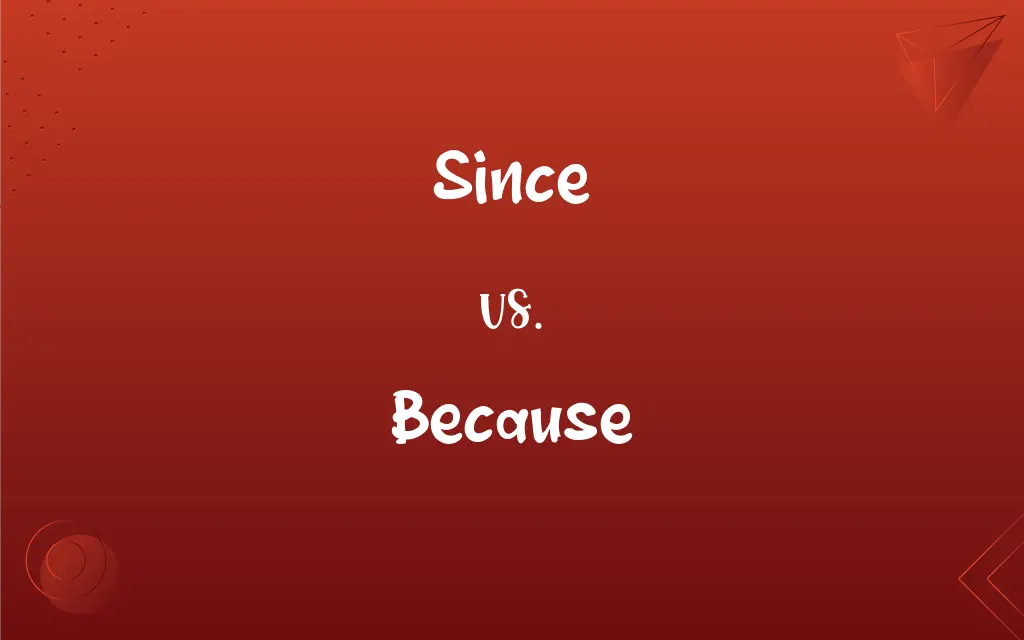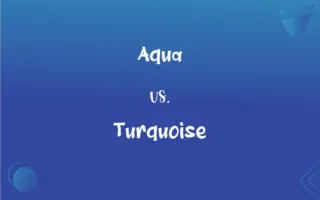Since vs. Because: What's the Difference?
Edited by Aimie Carlson || By Janet White || Updated on November 6, 2023
"Since" can indicate time or causation, while "Because" provides a reason or causation.

Key Differences
"Since" is a versatile word in the English language. When employed in sentences, it can indicate a starting point in time, highlighting the onset of a particular event or period. For example, someone might say they've known a person since 2010, pointing to the duration of their acquaintance. However, "Since" also serves as a conjunction to signify causation, much like "Because."
"Because," on the other hand, is more straightforward in its purpose. Primarily, it provides a reason or justification for an action, situation, or event. "Because" elucidates the why behind a statement, offering clarity on the motivation or cause. For example, a student might explain they're tired because they studied all night.
When comparing the two, "Since" is more multifaceted, straddling the worlds of time and reason. This dual role can occasionally lead to ambiguity if not used with care. "Because," meanwhile, is firmly rooted in explaining reasons and causes, with little room for misinterpretation.
Another subtle distinction is in their nuanced usage. For instance, when explaining the inception of a longstanding tradition, one would typically use "Since." However, when offering the core reason behind a decision, "Because" is the go-to choice.
Both words are vital in everyday communication, offering context, reasons, and timelines to our conversations. While "Since" gives depth in terms of duration and causation, "Because" delivers clarity on reasons and justifications.
ADVERTISEMENT
Comparison Chart
Primary Usage
Time or Reason
Reason or Causation
Conjunction Use
Can introduce cause or reason
Specifically introduces a cause or reason
Temporal Aspect
Indicates a starting point in time
Does not have a time-related function
Ambiguity
Can be ambiguous if context isn't clear
Directly points to a reason, less ambiguous
Example
"I've known him since 2010."
"I stayed up because I was reading."
ADVERTISEMENT
Since and Because Definitions
Since
Considering that
Since we're out of milk, I'll buy some.
Because
For the reason that
He left because he was tired.
Since
Because of the fact that
Since you're busy, I'll come later.
Because
To show causation
She cried because she was overwhelmed.
Since
Indicating time from a certain point
I've been here since morning.
Because
Giving explanation
I'm late because of traffic.
Since
From then until now or between then and now
They left town and haven't been here since.
Because
On account of
They celebrated because of the victory.
Since
Before now; ago
A name long since forgotten.
Because
For the reason that; since.
Since
After some point in the past; at a subsequent time
My friend has since married and moved to California.
Because
(archaic) For the reason that.
Since
Continuously from
They have been friends since childhood.
Because
On account of, for sake of.
My life is ruined because of you!
Since
Intermittently from
She's been skiing since childhood.
Because
(by ellipsis) Used alone to refuse to provide a full answer a question begun with "why", usually taken as an anapodoton of the elided full phrase "Because I said so".
Since
During the period subsequent to the time when
He hasn't been home since he graduated.
Because
By or for the cause that; on this account that; for the reason that.
I hid myself because I was afraid.
Since
Continuously from the time when
They have been friends ever since they were in grade school.
Because
As is known, inferred, or determined from the fact that.
It must be broken, because I pressed the button and nothing happened.
I don't think he is a nice person, because he yells at people for no reason.
Since
Inasmuch as; because
Since you're not interested, I won't tell you about it.
Because
(obsolete) So that, in order that.
Since
From a specified time in the past.
I met him last year, but haven't seen him since.
A short/long time since
Because
On account of, because of.
He rejected me because revenge, I guess.
It doesn't work because reasons.
Since
From: referring to a period of time ending in the present and defining it by the point in time at which it started, or the period in which its starting point occurred.
Because
By or for the cause that; on this account that; for the reason that.
Since
Continuously during that period of time.
I have known her since last year.
Because
In order that; that.
And the multitude rebuked them because they should hold their peace.
Because of these things cometh the wrath of God upon the children of disobedience.
Since
At certain points during that period of time.
Because
Indicating motive
He studied hard because he wanted to pass.
Since
From the time that.
I have loved you since I first met you.
Since
Because.
Since you didn't call, we left without you.
Since
(obsolete) When or that.
Since
From a definite past time until now; as, he went a month ago, and I have not seen him since.
We since become the slaves to one man's lust.
Since
In the time past, counting backward from the present; before this or now; ago.
How many ages since has Virgil writ?
About two years since, it so fell out, that he was brought to a great lady's house.
Since
When or that.
Do you remember since we lay all night in the windmill in St. George's field?
Since
From the time of; in or during the time subsequent to; subsequently to; after; - usually with a past event or time for the object.
The Lord hath blessed thee, since my coming.
I have a model by which he build a nobler poem than any extant since the ancients.
Since
Seeing that; because; considering; - formerly followed by that.
Since that my penitence comes after all,Imploring pardon.
Since truth and constancy are vain,Since neither love, nor sense of pain,Nor force of reason, can persuade,Then let example be obeyed.
Since
Continuously from a past point
She's been running since she heard the news.
Since
In the time following
He's been happier since the promotion.
FAQs
Is "Because" used to denote time?
No, "Because" indicates reason or causation.
Is "Because" always followed by a reason?
Typically, yes, it provides justification.
Can "Since" be ambiguous?
Yes, if the context doesn't clarify time or reason.
Why is "Because" important in explanations?
It provides clarity on reasons.
When is "Since" used in time context?
To indicate an ongoing action from a past point.
Can "Since" indicate a reason?
Yes, similar to "Because," it can give a reason.
Can "Since" indicate continuous action?
Yes, like "She's been singing since morning."
Can "Since" be used with exact dates?
Yes, like "since 1995."
Does "Because" clarify ambiguity?
Often, by providing the reason behind an action.
What follows "Because" in a sentence?
Typically, an explanation or reason.
How does "Since" relate to duration?
It marks the starting point of a duration.
Can "Because" begin a sentence?
Yes, especially in answers or explanations.
Does "Since" always need a past tense verb?
Often, but not always, depending on context.
Is "Since" synonymous with "From"?
Not always, but in some contexts related to time, they're similar.
Can "Because" be used without "of"?
Yes, "because of" and "because" can have different structures.
Are "Since" and "Because" interchangeable?
Sometimes, but context and clarity are crucial.
Can "Because" be used in questions?
Rarely, but it's more common in answers.
Can "Since" indicate a cause?
Yes, it can, similar to "Because."
Can "Since" refer to a past event?
Yes, like "Since the concert, he's been happier."
Is "Because" always necessary for reasoning?
No, other words like "as" or "for" can also give reasons.
About Author
Written by
Janet WhiteJanet White has been an esteemed writer and blogger for Difference Wiki. Holding a Master's degree in Science and Medical Journalism from the prestigious Boston University, she has consistently demonstrated her expertise and passion for her field. When she's not immersed in her work, Janet relishes her time exercising, delving into a good book, and cherishing moments with friends and family.
Edited by
Aimie CarlsonAimie Carlson, holding a master's degree in English literature, is a fervent English language enthusiast. She lends her writing talents to Difference Wiki, a prominent website that specializes in comparisons, offering readers insightful analyses that both captivate and inform.






































































